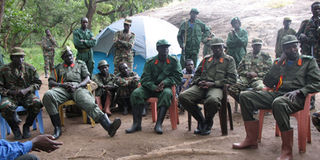Let’s not become complacent about post conflict north

Lord’s Resistance Army leader Joseph Kony (right, seated) and his commanders in Garamba National Park, DR Congo, in 2006. PHOTOS/ FILE
What you need to know:
- The media can identify, and come up with creative formats of storytelling that dissuade communities and families from engaging in any forms of violence of conflict.
The memory of the over two decades of war in Northern Uganda seems to be fading as the contemporary debate at the national level gradually shifts to infrastructural development of the former war torn region. Development of the post conflict Northern Uganda is of great importance but this should not be done in a way that erases its painful history of war and conflict, rather it should be done in a way that preserves this history as an important learning experience for both the present and future generation.
The stories of the war are well documented by journalists and scholars alike and as such, these perspectives and experiences should be incorporated in the preservation of history as opposed to leaving it as the sole responsibility of non-governmental organisations, Civil Society, or development partners. Cultural and religious leaders too should be brought on board.
The preservation of the memory of the conflict is important for understanding the root causes of the war, teaching young people about the impact and dangers associated with war, and importantly equipping young people with the knowledge. Tools, and or skills to avert tendencies that spark conflict and all forms of violence.
The famous Gulu Walk For Peace, Music concert for Peace, Secondary school and tertiary institutions peace debates, have long died out and yet these were important initiatives and platforms that brought together all persons of goodwill; young and old to shape the region’s trajectory of peacebuilding. These could be some of the tools and strategies used in countering the growing cases of land conflict in Acholi.
The current peace being experienced in the north should transcend the silence of guns and address contemporary issues such as climate change and the environment. The current war in the north is a silent one and does not involve the use of sophisticated weaponry; neither is it pitting any individual against another. Instead it is a war that has been orchestrated by man against the environment. The rampant and unchecked logging of trees for charcoal burning is evident for all to see.
Nonetheless, there is optimism and thanks to People like Mr Arthur Owor of the African Centre for Research, there is growing evidence to suggest that through activism, this war can be won. Through his activism dubbed “Our trees, we need answers’.
During talks to end the two decades of the LRA, Northern Uganda was known for having one of the best ‘community tailored peace radio programmes’ with well-trained and committed peace media in East Africa. The media provided a platform and a point of convergence for divergent views and perspectives that shaped the narrative for peacebuilding in the region.
The media remains a unique platform and resource that should be well-utilized to address today’s challenges such as land conflicts, environmental degradation, and youth unemployment. The media can identify, and come up with creative formats of storytelling that dissuade communities and families from engaging in any forms of violence of conflict.
James Ojok Onono, [email protected]




